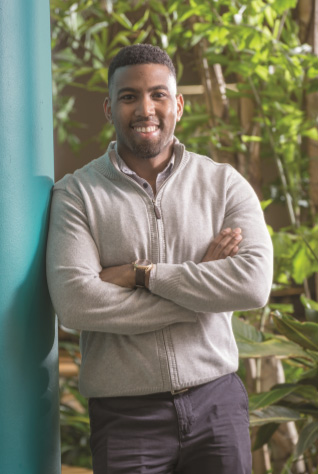Destination Excellence: Integration in the Sciences
By Austin A. Coley, Neuroscience PhD Candidate
A typical research laboratory consists of lab members from around the world, with diverse backgrounds. This remains important because it allows researchers from other countries and backgrounds to interact and learn more about another's culture and history, thus providing additional perspectives on scientific ideas and future collaborations. When people envision a "scientist," they think of someone who looks like Bill Nye, when in fact it is one of the more diverse fields.
Unfortunately, there is still a lack of minorities and individuals from underprivileged backgrounds — more specifically African Americans — pursuing scientific careers. This could be due to an absence of awareness, role models or, more important, confidence. Thankfully, there appears to be a strong interest in science and medicine within these communities, from grade school to graduate-level coursework. The problem is transitioning these interests into careers in STEM (science, technology, engineering and mathematics) fields.

Austin Coley was one of just 11 students nationwide to receive a new NIH award that funds current and postdoctoral work.
Need for Sustainable Efforts
Universities around the nation are diligently implementing programs that integrate students with diverse backgrounds into basic science research. However, to have a robust impact, there needs to be sustainability that lasts for years to encourage further recruitment and development. Furthermore, there need to be programs beginning in grade school to help nourish the youth who are interested in scientific careers. And lastly, there needs to be a stronger outreach from the scientific and educational community via social media that can connect with students across the nation.
I am a fourth-year Neuroscience PhD candidate in the Department of Neurobiology & Anatomy and was recently awarded an F99/K00 fellowship from the National Institutes of Health. My goal as a researcher is to advance the scientific field by understanding the molecular and cellular underpinnings of mental health disorders such as schizophrenia and autism. However, I have a responsibility as well to assist in the community and serve as a role model by inspiring and educating minority students interested in pursuing a career in STEM.
For instance, I was a speaker for Upward Bound, a program for inner-city youth at Mercer County Community College in Trenton, New Jersey. In addition, I volunteer at St. James School, a middle school in Philadelphia. This is extremely important to me personally, as I relate to many of the students who grew up in a similar environment, and thus I have the ability to understand and communicate effectively with them. My talks discuss the journey and passion for science I've always had; I also reveal the struggles I've experienced in the field as a young African-American male scientist.
A Duty to Pay It Forward
Recently, I was invited to speak to the Natural Sciences Department at Virginia Union University, a historically black university. The talk focused on my current research projects and future publications. But more importantly, the presentation encouraged many students of color to continue their dreams to become a scientist. We are now working to establish a bridge program to transition Virginia Union undergraduate students to the Graduate Program in Neuroscience at Drexel.
A lack of minority professionals in the STEM fields may discourage the younger generation from becoming scientists. My first mentor, Dr. Daniel Williams, is a professor at North Carolina Central University, also a historically black university. He introduced me to the biomedical sciences and provided me with the encouragement to succeed in this field. It is now my duty to pay it forward and empower the next generation of scientists. My career goals are to become a full professor and principal investigator at a research institute, but along the way, I will work continuously to motivate and encourage students of color to join the scientific field.
Back to Top